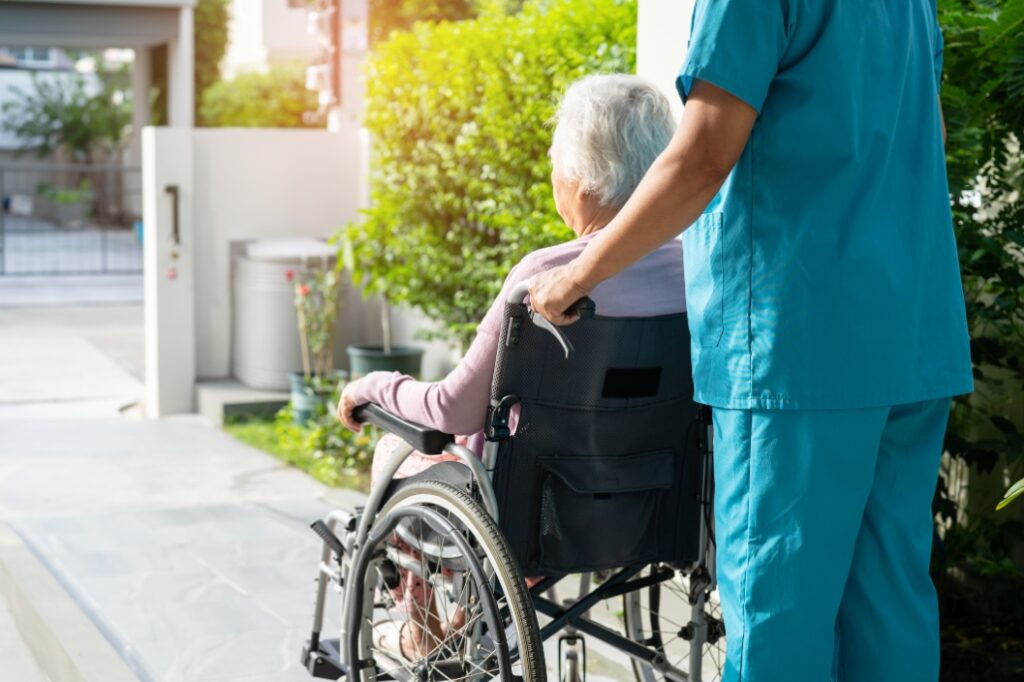Nursing home abuse often goes unreported. Victims of abuse may be afraid to speak up, or they may not know who to turn to for help. That’s where a qualified nursing home abuse lawyer comes in.
Horwitz, Horwitz & Associates can help. We have centuries of combined experience helping victims get the compensation and justice they deserve.
Our compassionate staff is available to take your call, answer questions, and explain legal options.
Book a free consultation with a Joliet nursing home abuse lawyer by calling (800) 985-1819 today.

How Can Our Joliet Nursing Home Abuse Lawyer Help You?
Because victims of nursing home abuse may experience a variety of different types of trauma, it’s important to seek immediate legal advice.
After you contact us, we can help you file a claim. You must take action as soon as possible after being neglected or abused in a nursing home.
By taking action now, our Joliet nursing home abuse lawyer may be able to get you more compensation than if you wait to file your claim. We also may be able to stop the nursing home from neglecting or abusing other residents.
Please do not wait to contact us.
What Are The Elder Abuse and Neglect Claims We Handle?
When you have been injured as a result of the carelessness or negligence of others, you need a skilled professional on your side.
A Joliet nursing home abuse lawyer with Horwitz, Horwitz & Associates will investigate and build strong cases against negligent parties. We know how to talk to insurance companies and get them to admit responsibility, saving you time and money.
Our attorneys can fight hard for your claim, knowing that if we don’t win, you don’t pay.
Types of Nursing Home Abuse
- Physical: The use of physical force to cause harm. Hitting, kicking, or any other physical contact that results in pain or injury are examples of physical abuse.
- Emotional abuse: Actions that cause the victim to feel distress, fear, and loss of self-worth. Someone who is emotionally abused can suffer from anxiety and depression. Emotional abuse occurs because staff members are not adequately trained or they cannot control their negative emotions. They may be overworked, but there is no excuse for abuse.
- Sexual: Sexual abuse is the use of force, intimidation, or coercion to elicit sexual contact. Sexual abuse can be verbal, visual, or anything that forces a person into non-consensual contact with their genitals and other body parts.
- Financial: Financial abuse occurs when someone uses a patient’s money, property, or other valuables without the patient’s consent. This happens because the staff members are trying to take advantage of the patient or because they do not know what else to do with their money.
- Healthcare fraud and abuse: Healthcare fraud and abuse occur when someone uses information about patients to make money by deceiving public health programs like Medicare. This includes lying about the services provided, billing for unnecessary or never-performed treatments, or charging for services that people have already received.
- Neglect: Neglect is one of the most common types of nursing home abuse. It occurs when someone inflicts harm on a patient or does not provide them with the care they need.
Are There Conditions That Worsen Elder Abuse?
Alzheimer’s and Dementia
People with Alzheimer’s and dementia have problems remembering, thinking, and concentrating. They might forget things that just happened or not be able to think of things from a long time ago.
Many people dealing with these conditions lose their ability to communicate and become unaware of what is happening.
This makes it easier for the abuser to take advantage of them. It also changes how much they can tell when reporting abuse since they may forget or be unable to describe details clearly.
Stubbornness
Stubbornness can get in the way of reporting abuse. People may not realize that what they are experiencing is abuse or think it’s their fault and punish themselves.
People who have stubborn personalities tend to be less open with others, including health care providers and family members. They can become more isolated and may not want to admit what is happening.
Social Isolation
Social isolation is when someone has little or no contact with family, friends, neighbors, or other people in their community. This can leave them vulnerable to abuse since they are not aware of the signs that indicate abuse.
They may also become more isolated if they notice the warning signs and want to avoid talking about it for fear of causing problems.
They can also become more isolated as a self-protective coping mechanism. This limits the number of people who might notice or report abuse and gives them fewer opportunities to protect themselves.
Past Experience With Difficulty Communicating
People who have had difficulties with communication in the past may be less likely to report abuse. This can include people with autism, developmental disabilities, depression, anxiety disorders, or other health conditions.
Some may think that talking about what’s happening will cause more problems than it solves. They may also believe they are capable of handling the situation themselves.
Poor Memory or Confusion
Like Alzheimer’s and dementia, general age-related confusion and memory problems can lead to abuse. They may make it harder for a person to protect themselves from abuse or understand when they are being abused.
If they do not know what is happening, they cannot report it. If the person’s memory is so bad that they have trouble remembering what happened, it may be even more challenging for them to report abuse or seek help.
Meet a Leading Joliet Nursing Home Abuse Lawyer Today
Be aware of the signs and symptoms of elder abuse so that you can report it. It is estimated that only 1 in 14 cases are actually reported.
Many people don’t realize they’re being abused, or they feel ashamed or embarrassed to talk about it. If you know someone who is elderly or has dementia, please keep an eye on them and be sure to report any suspicious behavior immediately. If you find yourself in a situation where you think you may be experiencing elder abuse, please don’t hesitate to reach out for help. You are not alone.
Contact the experienced Joliet nursing home abuse lawyer with Horwitz, Horwitz & Associates today. We want to hear your story and provide guidance on what legal options are available. A free, no-obligation case review is just a phone call away.
Call (800) 985-1819 now.
Commonly Asked Questions About Nursing Home Abuse
How Soon Will I Need to File an Elder Abuse Lawsuit?
In Illinois, you have two years to file an elder abuse lawsuit. If you don’t file within the two-year time limit, your claim may not be allowed to go forward.
You are not required to have all of the evidence necessary immediately after the abuse has occurred. It is okay to take time to put together all of your information as long as it’s done within the two-year timeframe.
This is why it’s best to file as soon as possible. It allows you to gather evidence and interview potential defendants while things are still fresh in your mind.
How Are Nursing Homes Regulated in Illinois?
The Illinois Department of Public Health regulates nursing homes. There are over 1,000 nursing homes in Joliet, with hundreds of thousands of residents in the area.
Nursing homes are inspected every 15 months by the Illinois Department of Health, with standards improving in recent years. Staff at Illinois nursing homes must follow the rules and regulations set forth by the Department of Public Health and the federal government. They must provide a good standard of care, which includes keeping them clean and comfortable and keeping residents safe from all types of abuse or neglect.
The Illinois Department of Public Health has the power to revoke licenses if any violations are found.


















